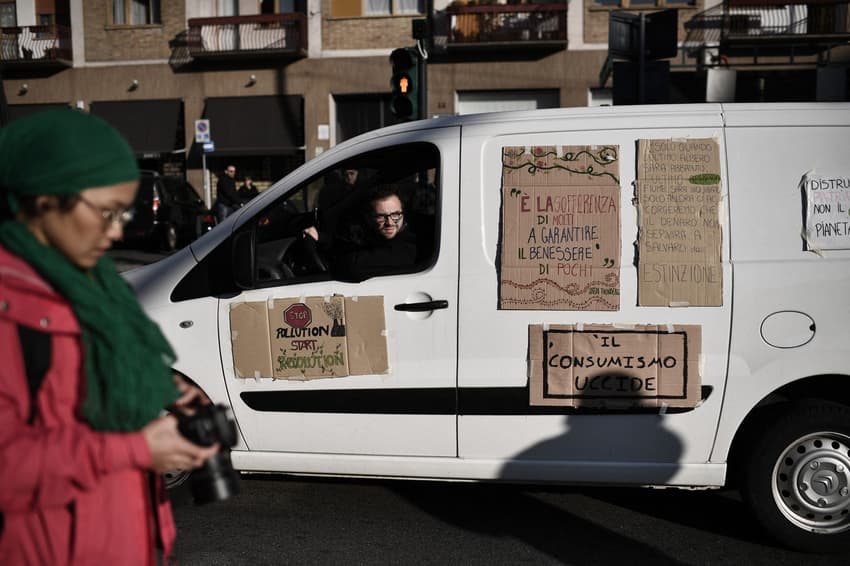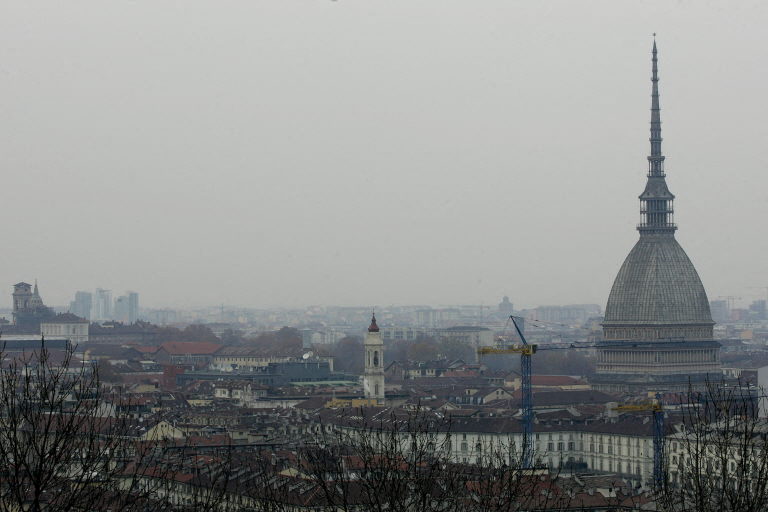‘I've lost hope': What it's like living in Italy's most polluted cities

High air pollution levels in Italy’s northern cities are in the news again, but local residents say smog - and its detrimental impact on health - is a constant problem with no solution in sight.
As we reported on The Local this week, soaring air pollution levels in northern Italy led authorities in some cities to put temporary anti-smog measures in place - but local residents say much more needs to be done.
Environmental watchdog Legambiente this month also urged the national government to act after its latest report found that 18 cities had violated clean air ordinances.
READ ALSO: Is Milan really the world's third most polluted city?
Frosinone ranked as the most polluted city in Italy this year, with Turin, Treviso, Mantua, Padua and Venice all following suit.
What makes the issue even more pressing is the 47,000 premature deaths in Italy in 2021 due to air pollution, which Legambiente said was "an intolerable number ... repeated year after year."
The latest spike in pollution levels is the last straw for Turin resident Amit Baum, who has been living in the old capital on and off for 10 years.
“Every time I come back from vacation, I can feel the difference,” he says, “ I have a runny nose even though the weather hasn’t changed and I feel a bit sick when I return to Turin and my body feels it. It’s like I’m not breathing clean air.”
Amit originally hails from Haifa, a polluted city in Israel. He is very conscious about pollution in general and studied preventative methods when he was a student at the Politecnico di Torino. He notices the difference immediately when he travels abroad and returns to his city.
“It’s visual too, I don’t just feel it,” he continues. “For most of the year, it is cloudy but without clouds; it’s a thin layer of smog.
“If I go up to the nearby hills, I cannot see the city below sometimes, just the Mole Antonelliana. This thin layer of smog also changes colour depending on the sun’s reflection. Sometimes it is grey and other times it is an opaque white. It’s almost like it is tangible.”

The city of Turin with the Mole Antonelliana tower overlooking the rooftops. Residents say the tower is sometimes the only part of the city visible from the nearby mountains due to smog. (Photo by PACO SERINELLI / AFP)
When asked if he has any hope for the future of the city he has called home for 10 years, Amit responds with a resounding "no".
He fully blames the local government for not implementing rules and regulations to improve the situation as a matter of urgency.
“I’m not sure if they are personally incapable or if there are too many bureaucratic hurdles, but nothing has changed here in the last decade and it is a huge shame," he says.
“The public transport is really bad and a lot of streets are not pedestrian friendly. There is no long-term plan, no real urban planning and a lot of bureaucracy. It pales in comparison to other European cities.”
READ ALSO:
- Italy delays Piedmont regional ban on old diesel vehicles
- Why Trento is ranked as Italy's 'greenest' place to live
- Why is air pollution in northern Italy so bad?
As a result of environmental inaction, Amit plans to leave Turin in the near future for a greener part of the country.
“I have no plan to see the city crumbling like this and then collapsing altogether," he says. “I can’t watch the city being neglected anymore. I have lost hope for my city, I cannot breathe in this dirt any longer.”
For Jamie Roberts, also a Turin resident from the southwest of the USA, the feeling is more than mutual; it is practically identical. The level of humidity is the biggest challenge for her and she finds her allergies are worse year-round than back home. She spends her summers unable to open her apartment windows due to the pollution.
“The pollution kicks my oversensitive system into overdrive,” she says. “When looking for a flat here in the future, I have to get one with an air conditioner and a dehumidifier as having my windows open is a huge no.
“I feel as though I am a mine canary who senses pollution, air quality, and allergens immediately, before others begin to react.”
Moving east over to the province of Treviso, the situation isn’t much better.
Treviso, as mentioned above, is another of the worst-affected cities in the country. Local resident Maria Erdova has spent four and a half years in a small town near the city named Spresiano. She says the air quality is much lower than in her native Bratislava, despite the latter being a capital.
“This January was the worst for me and my partner so far,” she says. “He has asthma, so I don’t open the windows and if I do I use our air purifier immediately after.
“We get constant headaches, feel tired and sneeze and cough a lot on high pollution days. We won't go out then.”
The fact that the local government is not trying to improve this situation baffles Maria. She also says public transport in the area is bad, leading households to have multiple cars.
“From our balconies, we see the mountains and when the air is really polluted we can't see them at all, the sky is completely grey. It’s depressing.”
If you're affected by air pollution in Italy, please get in touch to share your views in the comments section below.
Comments (1)
See Also
As we reported on The Local this week, soaring air pollution levels in northern Italy led authorities in some cities to put temporary anti-smog measures in place - but local residents say much more needs to be done.
Environmental watchdog Legambiente this month also urged the national government to act after its latest report found that 18 cities had violated clean air ordinances.
READ ALSO: Is Milan really the world's third most polluted city?
Frosinone ranked as the most polluted city in Italy this year, with Turin, Treviso, Mantua, Padua and Venice all following suit.
What makes the issue even more pressing is the 47,000 premature deaths in Italy in 2021 due to air pollution, which Legambiente said was "an intolerable number ... repeated year after year."
The latest spike in pollution levels is the last straw for Turin resident Amit Baum, who has been living in the old capital on and off for 10 years.
“Every time I come back from vacation, I can feel the difference,” he says, “ I have a runny nose even though the weather hasn’t changed and I feel a bit sick when I return to Turin and my body feels it. It’s like I’m not breathing clean air.”
Amit originally hails from Haifa, a polluted city in Israel. He is very conscious about pollution in general and studied preventative methods when he was a student at the Politecnico di Torino. He notices the difference immediately when he travels abroad and returns to his city.
“It’s visual too, I don’t just feel it,” he continues. “For most of the year, it is cloudy but without clouds; it’s a thin layer of smog.
“If I go up to the nearby hills, I cannot see the city below sometimes, just the Mole Antonelliana. This thin layer of smog also changes colour depending on the sun’s reflection. Sometimes it is grey and other times it is an opaque white. It’s almost like it is tangible.”

When asked if he has any hope for the future of the city he has called home for 10 years, Amit responds with a resounding "no".
He fully blames the local government for not implementing rules and regulations to improve the situation as a matter of urgency.
“I’m not sure if they are personally incapable or if there are too many bureaucratic hurdles, but nothing has changed here in the last decade and it is a huge shame," he says.
“The public transport is really bad and a lot of streets are not pedestrian friendly. There is no long-term plan, no real urban planning and a lot of bureaucracy. It pales in comparison to other European cities.”
READ ALSO:
- Italy delays Piedmont regional ban on old diesel vehicles
- Why Trento is ranked as Italy's 'greenest' place to live
- Why is air pollution in northern Italy so bad?
As a result of environmental inaction, Amit plans to leave Turin in the near future for a greener part of the country.
“I have no plan to see the city crumbling like this and then collapsing altogether," he says. “I can’t watch the city being neglected anymore. I have lost hope for my city, I cannot breathe in this dirt any longer.”
For Jamie Roberts, also a Turin resident from the southwest of the USA, the feeling is more than mutual; it is practically identical. The level of humidity is the biggest challenge for her and she finds her allergies are worse year-round than back home. She spends her summers unable to open her apartment windows due to the pollution.
“The pollution kicks my oversensitive system into overdrive,” she says. “When looking for a flat here in the future, I have to get one with an air conditioner and a dehumidifier as having my windows open is a huge no.
“I feel as though I am a mine canary who senses pollution, air quality, and allergens immediately, before others begin to react.”
Moving east over to the province of Treviso, the situation isn’t much better.
Treviso, as mentioned above, is another of the worst-affected cities in the country. Local resident Maria Erdova has spent four and a half years in a small town near the city named Spresiano. She says the air quality is much lower than in her native Bratislava, despite the latter being a capital.
“This January was the worst for me and my partner so far,” she says. “He has asthma, so I don’t open the windows and if I do I use our air purifier immediately after.
“We get constant headaches, feel tired and sneeze and cough a lot on high pollution days. We won't go out then.”
The fact that the local government is not trying to improve this situation baffles Maria. She also says public transport in the area is bad, leading households to have multiple cars.
“From our balconies, we see the mountains and when the air is really polluted we can't see them at all, the sky is completely grey. It’s depressing.”
If you're affected by air pollution in Italy, please get in touch to share your views in the comments section below.
Join the conversation in our comments section below. Share your own views and experience and if you have a question or suggestion for our journalists then email us at [email protected].
Please keep comments civil, constructive and on topic – and make sure to read our terms of use before getting involved.
Please log in here to leave a comment.